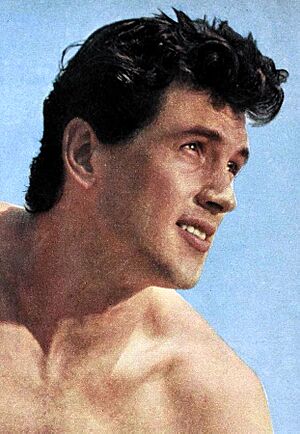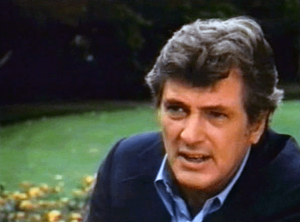Rock Hudson facts for kids
Quick facts for kids
Rock Hudson
|
|
|---|---|
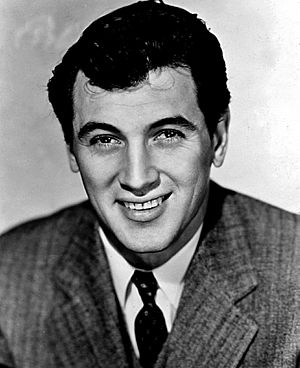
Hudson in 1952
|
|
| Born |
Roy Harold Scherer Jr.
November 17, 1925 Winnetka, Illinois, U.S.
|
| Died | October 2, 1985 (aged 59) |
| Monuments | Cenotaph at Forest Lawn Cemetery, Cathedral City, California |
| Other names | Roy Harold Fitzgerald (adoption surname from stepfather) |
| Occupation | Actor |
| Years active | 1948–1985 |
| Height | 6 ft 5 in (196 cm) |
| Spouse(s) |
Phyllis Gates
(m. 1955; div. 1958) |
Rock Hudson (born Roy Harold Scherer Jr.; November 17, 1925 – October 2, 1985) was a famous American actor. He was one of the most popular movie stars of his time. His acting career lasted for over 30 years. He became a big star during the Golden Age of Hollywood.
Rock Hudson became famous with his role in Magnificent Obsession (1954). He then starred in All That Heaven Allows (1955) and Giant (1956). For Giant, he was nominated for an Academy Award for Best Actor. Hudson also had great success in romantic comedies with Doris Day. These included Pillow Talk (1959), Lover Come Back (1961), and Send Me No Flowers (1964).
Later, he moved to television. He starred in the popular mystery series McMillan & Wife (1971–1977). His last acting role was on the TV show Dynasty (1984–1985).
Early Life and Career Start
Rock Hudson was born Roy Harold Scherer Jr. on November 17, 1925. He was born in Winnetka, Illinois. His father left the family when Rock was young. His parents divorced when he was four years old. A few years later, his mother married Wallace Fitzgerald. Roy's name became Roy Harold Fitzgerald after his stepfather adopted him.
Hudson went to New Trier High School in Winnetka. As a teenager, he worked as an usher in a movie theater. This made him interested in acting. He tried out for school plays but found it hard to remember his lines. This problem continued early in his acting career.
He finished high school in 1943. The next year, he joined the United States Navy during World War II. He trained and then worked as an aircraft mechanic in the Philippines. In 1946, he returned to the U.S. and left the Navy.
Moving to Hollywood
After the Navy, Hudson moved to Los Angeles. He wanted to become an actor. He worked odd jobs, like being a truck driver. He tried to get into a drama program but was not accepted.
In 1947, he sent a picture to a talent scout named Henry Willson. Willson became his agent and changed his name to Rock Hudson. Hudson later said he didn't like the name. The name "Rock" came from the Rock of Gibraltar. "Hudson" came from the Hudson River. Hudson later named his own film company Gibraltar Productions.
Becoming a Movie Star
Rock Hudson's first small acting part was in the film Fighter Squadron (1948). It took him 38 tries to say his only line correctly!
Early Films at Universal-International
Universal-International signed Hudson to a long contract. He received training in acting, singing, dancing, and more. He started appearing in movie magazines.
His first film at Universal was Undertow (1949). He had small roles in films like Winchester '73 (1950) and The Desert Hawk (1950). He also appeared in Iron Man (1951) and Bend of the River (1952).
Becoming a Leading Man
Hudson became a leading man in Scarlet Angel (1952) with Yvonne De Carlo. He also starred with Piper Laurie in Has Anybody Seen My Gal? (1952). This was his first film directed by Douglas Sirk.
He continued to star in films like The Lawless Breed (1953) and Seminole (1953). He even appeared in a commercial for Camel cigarettes in 1953.
Magnificent Obsession and Big Success
What made Rock Hudson a huge star was the romantic drama Magnificent Obsession (1954). He starred with Jane Wyman. The film was very popular and earned a lot of money.
Hudson then made adventure films like Bengal Brigade (1954) and Captain Lightfoot (1955). In 1954, he was voted the 17th most popular star in the U.S. He also starred in the dramas One Desire (1955) and All That Heaven Allows (1955).
Giant and Oscar Nomination
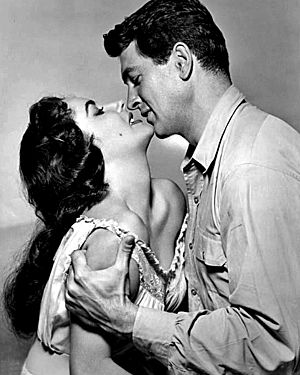
Hudson's fame grew even more with George Stevens' film Giant (1956). He and his co-star James Dean were both nominated for Oscars for Best Actor. Another hit was Written on the Wind (1957).
These films made Hudson the most popular actor in American cinemas in 1957. He remained one of the "top ten" stars until 1964.
Some of his other films from this period included Something of Value (1957) and A Farewell to Arms (1957). He also made The Tarnished Angels (1958) and This Earth Is Mine (1959).
Romantic Comedies and Continued Success
Rock Hudson teamed up with Doris Day for the romantic comedy Pillow Talk (1959). This movie was a huge success. Hudson was voted the most popular star in the country in 1959. He stayed very popular for the next three years.
He then made two more very popular comedies: Come September (1961) with Gina Lollobrigida, and Lover Come Back (1961) with Doris Day.
He also starred in dramas like The Spiral Road (1962) and A Gathering of Eagles (1963). In 1963, he was still the third most popular star. Hudson returned to comedy with Man's Favorite Sport? (1964) and Send Me No Flowers (1964), his last film with Doris Day.
Later Films and Television Work
Some of Hudson's later films were not as successful. These included Strange Bedfellows (1965) and A Very Special Favor (1965).
He tried different types of roles. He starred in the science-fiction thriller Seconds (1966). This film is often considered one of his best performances. He also appeared in action films like Tobruk (1967) and Ice Station Zebra (1968). Ice Station Zebra was his personal favorite role.
Hudson also acted in westerns, like The Undefeated (1969) with John Wayne. He co-starred with Julie Andrews in the musical Darling Lili (1970).
Success on Television
In the 1970s and 1980s, Rock Hudson starred in many TV movies and series. His most successful TV show was McMillan & Wife. He played police commissioner Stewart "Mac" McMillan. His co-star was Susan Saint James. Their chemistry made the show a big hit from 1971 to 1977.
While on McMillan & Wife, Hudson also made films like Showdown (1973) and the science-fiction film Embryo (1976). He also performed in live theater, with his play I Do! I Do! in 1974 being very well received.
After McMillan ended, Hudson appeared in the disaster movie Avalanche (1978) and miniseries like Wheels (1978) and The Martian Chronicles (1980). He also reunited with his Giant co-star Elizabeth Taylor in The Mirror Crack'd (1980).
Later Years and Health Challenges
In the early 1980s, Rock Hudson began to have health problems. He had a heart attack in November 1981 and needed heart surgery. This caused him to take a year off from his new TV show, The Devlin Connection. The show was later canceled. His health issues also made him turn down a role in the movie First Blood.
Even after heart surgery, he continued to smoke. He kept working, appearing in TV movies like World War III (1982). He was not well while filming The Ambassador in Israel in 1983-1984.
From late 1984 to early 1985, Hudson had a recurring role on the TV show Dynasty. He played Daniel Reece, a wealthy horse breeder. While filming Dynasty, his speech became noticeably worse. He had always found it hard to remember lines and used cue cards. Because of his worsening health, his character was written out of the show.
Personal Life
Rock Hudson married Phyllis Gates, his agent's secretary, in 1955. Gates later wrote that she dated him for several months before he proposed. They were married for three years. Gates filed for divorce in April 1958. Hudson did not fight the divorce. Gates never remarried.
Hudson was raised as a Roman Catholic. A week before he passed away, his publicist asked a priest to visit him. Hudson made a confession and received communion.
Illness and Passing
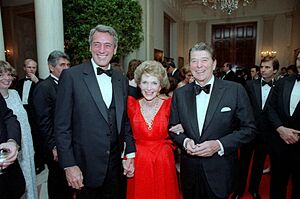
Rock Hudson was diagnosed with a serious illness on June 5, 1984. He kept his illness a secret for many months. He continued to work and traveled to other countries seeking treatment.
On July 16, 1985, Hudson joined his old friend Doris Day for a press conference. They were announcing her new TV show. Hudson had visited Day's ranch a few days earlier. He looked very thin and tired. His appearance shocked many people, and news outlets began to guess about his health. Doris Day later said, "He was very sick. But I just brushed that off and I came out and put my arms around him and said 'Am I glad to see you.'"
Two days later, Hudson traveled to Paris, France, for more treatment. On July 21, he collapsed in his hotel room. His publicist then announced that Hudson had inoperable liver cancer. This was a way to explain his severe illness to the public.
Hudson flew back to Los Angeles on July 30. He was so weak that he had to be carried off the plane on a stretcher. He spent almost a month at UCLA Medical Center. In late August 1985, he returned home for private care.
Rock Hudson passed away peacefully in his sleep at his home in Beverly Hills on October 2, 1985. He was 59 years old. Hudson had asked for no funeral. His body was cremated hours after his death. A cenotaph (a monument for someone buried elsewhere) was later placed at Forest Lawn Cemetery in Cathedral City, California. His ashes were scattered in the ocean.
Legacy and Recognition
Rock Hudson received a star on the Hollywood Walk of Fame for his work in movies. It is located at 6116 Hollywood Blvd. After his death, Elizabeth Taylor, who starred with him in Giant, bought a bronze plaque for him on the West Hollywood Memorial Walk. In 2002, he also received a Golden Palm Star on the Palm Springs Walk of Stars.
Awards and Honors
Rock Hudson received many awards during his career. He was named "Most Popular Male Star" by Photoplay Awards in 1956, 1957, and 1959. He also won the "World Film Favorite – Male" Golden Globe Award in 1959, 1960, 1961, and 1963. He won the Bambi Awards for "Best Actor – International" multiple times for his films like This Earth Is Mine, Pillow Talk, Come September, The Spiral Road, Man's Favorite Sport?, and Seconds. In 1976, he won the TP de Oro award for "Best Foreign Actor" for his role in McMillan & Wife.
Images for kids
Error: no page names specified (help).
- Rock Hudson's Home Movies
See also
 In Spanish: Rock Hudson para niños
In Spanish: Rock Hudson para niños
 | George Robert Carruthers |
 | Patricia Bath |
 | Jan Ernst Matzeliger |
 | Alexander Miles |


